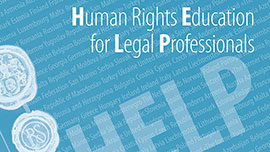International Day Against Homophobia, Transphobia and Biphobia has been commemorated today in Podgorica by the Council of Europe’s Programme Office, Ombudsperson’s Office, Ministry of Human and Minority Rights and representatives of the civil sector, under the framework of the project “Support to the National Institutions in Preventing Discrimination in Montenegro” (PREDIM), co-funded by the European Union and Council of Europe, and implemented by the Council of Europe.
On behalf of the Council of Europe’s Programme Office, Ms Angela Longo, Head of Operations, referred to the Council’s strategic cooperation framework with Montenegro, based upon the ECtHR case-law and CoE overall standards, underlining the relevance of LGBTI rights as one of the key policy areas in this respect. She pledged further support to the national counterparts from public and civil sector towards streamlining human rights standards standards and curbing the discriminatory practices in regards to the Homophobia, Transphobia and Biphobia, as the improvement of everyday lives of all citizens is the ultimate goal.
Mr Sinisa Bjekovic, Deputy Ombudsman for Anti-Discrimination, reminded on the profound spcial discrimination that LGBTIQ persons are exposed in Montenegro and that consecutive opinion surveys had been documenting standard high level of negative perception by the citizens. Mr Bjekovic concluded that these factors had adversarial effect on the visibility of LGBTIQ persons and prolonged tendency to keep their sexual orientation secret. In addition to the broad range of human rights violation against LGBTIQ persons, including the cases of violence, Mr Bjekovic emphasized the importance of voicing our concerns over homophobia related problems and joint actions towards the ensured equality for all citizens.
Ms Blanka Radosevic Marovic, Director General for Promotion and Protection of Human Rights and Freedoms at Ministry of Human and Minority Rights, gave her presentation from the perspective of civic culture perspectives, reaffirming the importance of tolerance and acceptance of opposites, which is the bedrock for successful legislative and institutional reforms towards elimination of discriminatory practices. She also spoke on the importance of municipal level activism, since the situation surrounding the LGBTIQ persons is not the same if you live in the capital or at some conservative smaller community. For those reasons, Ministry would intensify their work with Montenegrin municipalities and further promote the practice of the Rainbow cities Network, which have been highlighted through the cooperation with the Council of Europe.
Representatives of local LGBT activists’ CSOs – Mr John M. Barac, LGBT Forum Progres, and Mr Jovan Ulićević, Queer Montenegro, spoke extensively of their personal and perspectives of the LGBTIQ community they represent, on problems they face – in everyday life and communication with citizens and national institutions, specifying they wish not to be perceived as special, nor their rights as some kind of special additions, but as ordinary citizens with rights necessary for them to run ordinary life. In that regards, it has been noted that strong progress in accepting differences – from the moment when the human rights discourse of LGBTIQ persons had been initiated. This especially refers to the gradually decreasing level of discrimination and violence towards LGBTIQ persons, as well as level of public awareness on their rights and acceptance by their families.
At the end of the event Mr Boris Ristovic, CoE’s Senior Project Officer, in charge of the PREDIM project, presented the key activities, with specific focus on the enhanced policy and legislative framework for the protection of the human rights of marginalised groups (LGBT, Roma, minorities and people with disabilities) under the competencies of the Ministry for Human and Minority Rights, as well as improved capacity of the Ombudsperson’s Office to process anti-discrimination cases and carry out NPM functions. Furthermore, PREDIM would contribute to the treatment of the marginalized groups in the prison system, through the capacity building programme for the prison staff and the development of a training curriculum for judges in thematically centered around the ECtHR case-law in the areas of discrimination and homophobia and transphobia, and based upon the HELP methodology.





